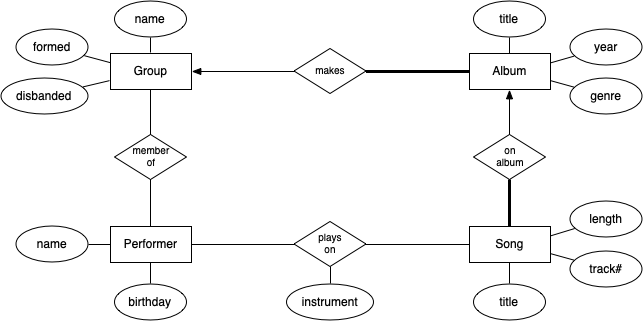We have designed and built a database of (fake) information about modern popular music. This database contains information about performers, the music groups they belong to, the albums those groups release, and the songs on those albums. The following ER design describes this database:

Note that we have omitted the primary keys in the above diagram. They are all implemented as numeric attributes called id in the SQL implementation.
An SQL schema based on this design:
create table Groups ( id integer, name text not null, formed date not null, -- when the group formed disbanded date, -- when they split up (null if still together) primary key (id) ); create table Albums ( id integer, title text not null, year integer not null check (year >= 1980), made_by integer not null, -- which group made this album genre text not null, primary key (id), foreign key (made_by) references Groups(id) ); create table Performers ( id integer, name text not null, birthday date, primary key (id) ); create table Songs ( id integer, title text not null, length integer not null check (length > 0), -- seconds on_album integer not null, -- which album this song appears on trackNo integer not null check (trackNo > 0), -- position primary key (id), foreign key (on_album) references Albums(id) ); create table PlaysOn ( performer integer, song integer, instrument text, primary key (performer,song,instrument), foreign key (performer) references Performers(id), foreign key (song) references Songs(id) ); create table MemberOf ( in_group integer, performer integer, primary key (in_group,performer), foreign key (in_group) references Groups(id), foreign key (performer) references Performers(id) );
Notes on the above schema:
- performers belong to a single Group (even though MemberOf is n:m)
- an album is a collection of songs made by one group
- album titles and song titles are not necessarily unique
- however, on a given album, song titles are unique
- a performer may play multiple instruments in a given song
- vocals are counted as an instrument in some contexts
- each group member typically plays on only some songs on an album
- albums are sometimes called CDs
You should familiarise yourself with this schema before proceeding to solve the queries. It would also be useful to examine the database contents to ensure that you understand what all of the data represents.